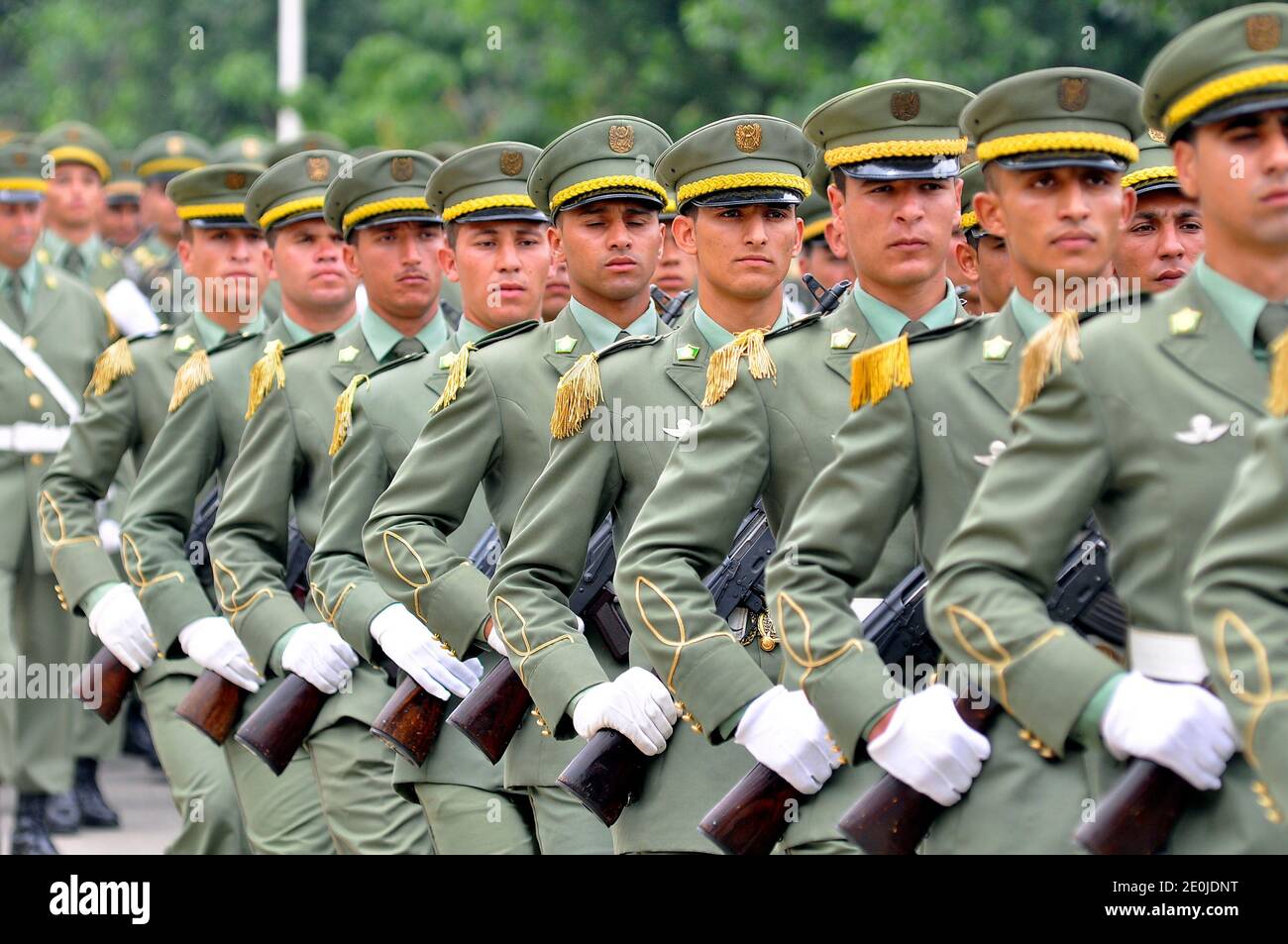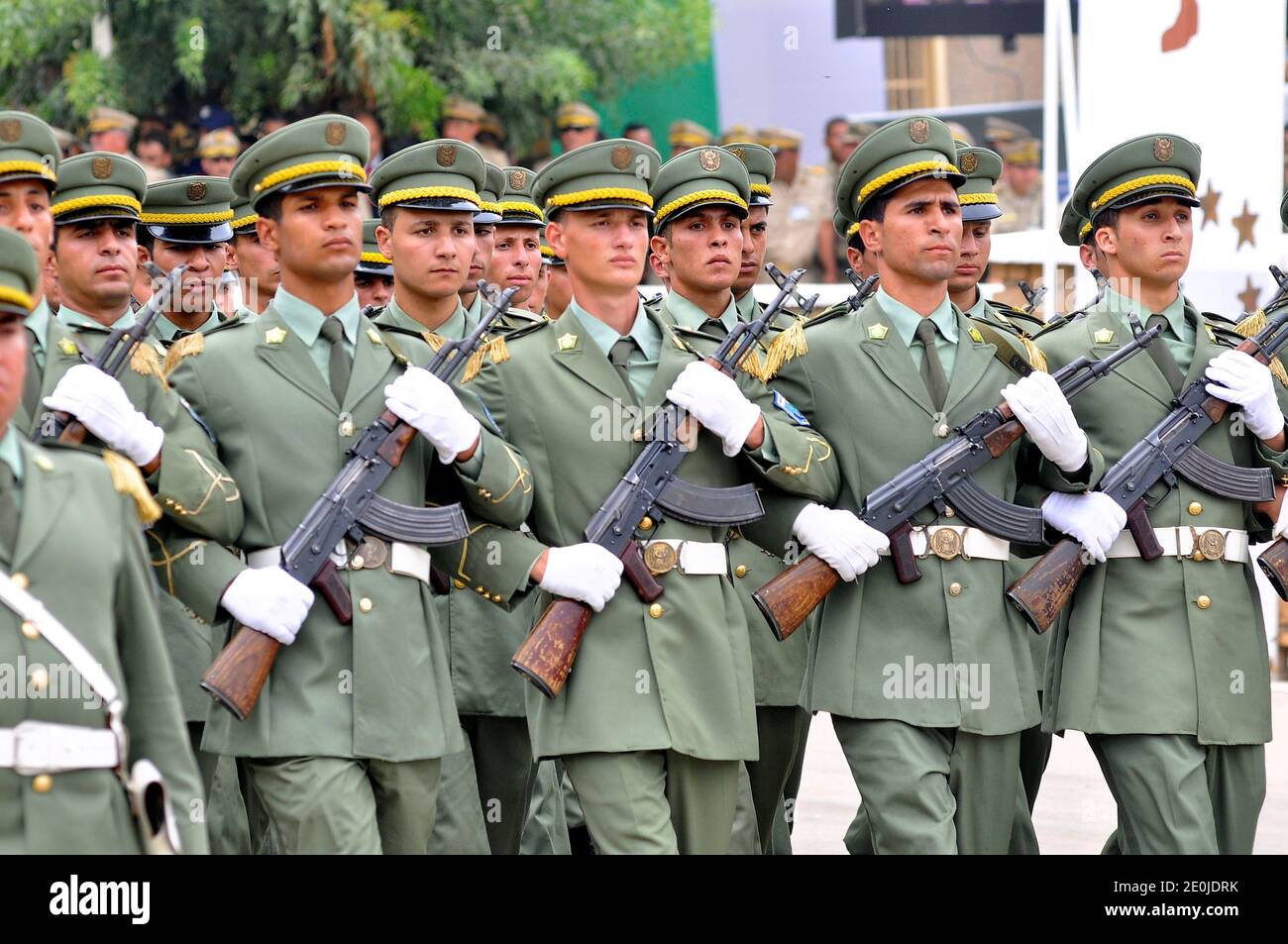Algeria Military - The major part of Algeria's armed forces are directed towards the country's western border with Morocco and Western Sahara, where Algeria supported a guerrilla war (1975–1991) against Moroccan control by the Polisario Front, a national liberation movement of Sahrawi Bedouin exiled in Algeria's Tindouf
province. Algeria has had longstanding border disagreements with Morocco, due to the non-recognition of the colonial borders by the Moroccan regime, which, although now basically resolved, continue to linger as a factor in the consistently troubled but generally non-violent relations between the two
Algeria Military

neighboring nations. The Algerian-Moroccan land border has been closed since 1994. Both countries's armed forces have engaged in costly equipment upgrades in recent years, clearly viewing each other as the principal threat to their sovereignty, and equally reluctant to let the other nation gain the upper hand
Major Exercises
militarily. For instance in late 2018, the government of Russia and Algeria floated the possibility of creating a joint venture in Algeria for the production, extension of service life and disposal of guided and unguided ammunition, said the head of the Federation Council Committee on Defense and Security
Viktor Bondarev. Algeria is considered one of Russia’s most important military allies on the African continent and also one of the largest customers of Russian weapons in the region. Over the last few years, Algeria has signed large arms deal with Russia for the supply of various types of armaments and equipment, especially air and ground weaponry.

In 2006, multi-billion dollar purchases of Russian military equipment were made in order to upgrade the country's conventional arsenal. This included a deal by the Algerian Air Force to purchase 28 Su-30MKA and 36 MiG-29SMT for up to $3.5 billion.
However, those MiG-29s were returned to Russia in February 2008 because of poor quality of their airframe, after technical evaluations in Algeria.[5][6] In May 2008 the two governments agreed a new deal to replace those 36 MiG-29SMT by a new batch of 16 Su-30MKA which meet all requirements of Algerian Air Force, but the issue does not appear to be completely resolved in 2009.
var d_names = new Array("Sunday", "Monday", "Tuesday", "Wednesday", "Thursday", "Friday", "Saturday"); var m_names = new Array("January", "February", "March", "April", "May", "June", "July", "August", "September", "October", "November", "December"); var d = new Date(); var minutes = d.getMinutes();
if (minutes < 10){minutes = "0"+minutes;} document.write('' + d_names[d.getDay()] + ', ' + d.getDate() + ' ' + m_names[d.getMonth()] + ' ' + d.getFullYear() + ''); document.write(' | ' + d.getHours() + ':' + minutes + '');

Algeria has the largest defense budget in Africa. Historically, Algeria purchased weapons and military equipment from the Soviet Union. Currently, Algeria is undergoing a process of military modernization, which includes the introduction of new, more modern warships, aircraft, and tanks.[2]
The agreement led to a signing to acquire four Project 22160-class patrol ships worth a total value of $180 million. The agreement signed on May 14 2018, reveals that Algeria will receive the first unit from Russia in September 2018 while the rest would be delivered in the coming years.
Military forces are supplemented by a 150,000-member gendarmerie and 200,000-member Sûreté nationale or Metropolitan police force under the Ministry of the Interior.[citation needed] Military intelligence, recognized to have played a major political role, was long called Sécurité militaire (Military
Security, SM) but reorganized in the late 1980s and early 1990s into today's Département du renseignement et de la sécurité (Department of Intelligence and Security, DRS). The DRS and its counter-espionage branch, DCE, assumed a leading role in the fight against the Islamist insurgency of the 1990s through a number of its own special forces units, as well as by establishing joint task force commands which assumed control over specialized military

and police units. This visit “represents, for us, the expression of the firm and frank willingness that animates the two countries to further strengthen the strategic and historic partnership that characterizes their bilateral relations, particularly in the field of military cooperation,” said Chanegriha.
By contrast, Algeria's post-independence border disagreements with Tunisia and Libya, which were at times a cause for poor relations, both appear to have been peacefully resolved (to its advantage). The Algerian army has also, especially in later years, been highly active along the country's border with northern Mali, where various insurgent movements are based.
Algeria has fought only one brief war after independence (the Sand War, a border conflict with Morocco in 1963), but the country is also, like most Arab nations, formally at war with the Israel since 1948.
The army, in the process of being reorganized into four divisions in 1993, also has numerous independent brigades and battalions. Its antecedents were the conventional military units formed in Morocco and Tunisia during the War of Independence from France.

Except for brief clashes with Morocco in 1976, the armed forces have not been involved in hostilities against a foreign power. Their combat capabilities in defense of the country has thus remained untested. Algeria's primary military supplier has been the former Soviet Union, which has sold various types of sophisticated equipment under military trade agreements, and the People's Republic of China.[citation needed] Since independence in the 1960s, no foreign bases are known to have been allowed
in Algeria, although in the 1970s and 1980s, particularly, large numbers of Soviet military advisers were stationed in the country. Since 2001, security cooperation with the United States has increased, and US forces have taken part in training missions in the country's Saharan south.
On 19 January 2013, the Algerian troops killed 32 Militant Hostage takers and freed the surviving hostages held at the Tigantourine gas facility, situated near In Amenas in the Illizi Province. Nearly 48 hostages are confirmed to be dead.
The kidnappers said the assault on the gas plant was launched in retaliation for French intervention against Islamist groups in neighboring Mali. The Algerian People's National Army (APNA) is the armed forces of the People's Democratic Republic of Algeria.

Algeria has a large and reasonably well-equipped military to counter foreign and domestic threats. The People's National Army include ground forces, an air force, navy, and an air defense command. Algeria also has a small domestic military industry of its own.
The Army produces assault rifles AK-47 ( 7.62mm ) and AK-74 ( 5.45mm ) licensed by Russia and China as well as rocket-type RPG in the Construction Company Mechanical Khenchela. The logistics base station produces various types of AICV ( Armored Infantry Fighting Vehicle ) for the recognition and transport of troops and light armored vehicles for the maintenance of order.
The air force produces two types of light aircraft for the basic training and produces its own drone reconnaissance since December 2010. The Russian company Rosoboronexport, has expressed a request for financial assistance to several countries including Algeria, Iran, Saudi Arabia and the UAE to participate
in the project for the production of the T-50 (PAK-FA) 5th generation fighter aircraft. The Algerian military élite has played a dominant role in Algerian politics ever since independence in 1962, when the army emerged as the only effective powerbroker in a shattered political landscape dominated by weak and competing political factions.
Many high-ranking officers have held public office, and it is generally recognized that the army has been, and still is, consistently involved in national policy from behind the scenes. Under Col. Houari Boumediène (1965–1979) state and army leadership was joined under his dominant and highly authoritarian presidency, but after his death, factionalization and rivalries within the military and political élites has been a major factor in Algerian politics.
algeria military equipment, algerian army equipment, algeria armed forces, morocco vs algeria military, algeria military power, algerian army, algeria military strength, algerian military ranks